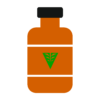Withania somnifera (fam. Solanaceae. Indian Ginseng, Withania, Ashwagandha – root, all parts used) strong tincture made by Herbactive Health.
Actions and uses: adaptogen, rejuvenating, balancing, strengthening, calming; relieves fatigue, nervous exhaustion, memory loss; aphrodisiac, sterility in men, sexual ailments; mild sedative, promotes calm sleep; promotes tissue regeneration; slows aging; body building (natural steroids; instant charge of long-lasting energy); Alzheimer’s and memory problems; arthritic pain (has natural steroidal compounds), carpal tunnel syndrome, autoimmune disorders (e.g. lupus), cancer, increases potency, stress. The root of this plant is widely used in Ayurvedic medicine to augment the faculty of learning and memory retention, and to attenuate cerebral function deficits in the elderly. It is regarded as being particularly useful as a “nervine restorative” in those who have memory impairment and general debility, both common components of the benzodiazepine withdrawal syndrome. Adaptogenic effects have been shown in several studies, and the increase in numbers of dopamine receptors in the corpus striatum produced due to stress, was prevented by pretreatment with Withania.38 Withania is also reported to have anxiolytic39 and slight CNS depressant effects.40-43 Radioligand binding and functional studies, have found that an extract of Withania acts probably as an agonist at GABA receptors,16 and this may account for some of these actions on the nervous system. The combination of these actions, makes Withania ideally suited as a medium-term, gently relaxing adaptogenic agent for many clients to be taken during and after both benzodiazepine and opiate withdrawal. Pharmacological Action: tonic, aphrodisiac, sattvic. Indications (Uses): rheumatism, emaciation, sexual debility, infertility, edema, TB, worms, spermatorrhea, dis. of nerves, V and K schizophrenia, anti-epileptic for grand mal; tonic, adaptogen, nervine sedative, anti‑inflammatory, anti‑tumour (in high doses), aphrodisiac, sattvic indications.
Constituents: alkaloids etc.
C/I Pregnancy – do not take if you are pregnant (but not all agree with this). Others suggest that it is a good tonic herb not only safe but beneficial during pregnancy. (Bone). Contraindications (Cautions): Some sources suggest that the alkaloids in ashwaghanda presents a risk as an abortifacient during pregnancy. (McGuffin 124). This herb is fine for some who are pregnant, probably who have had other children, but for first pregnancies Alan Hopking recommends that this herb is avoided.
| Weight | N/A |
|---|---|
| Size |
 From:
From: